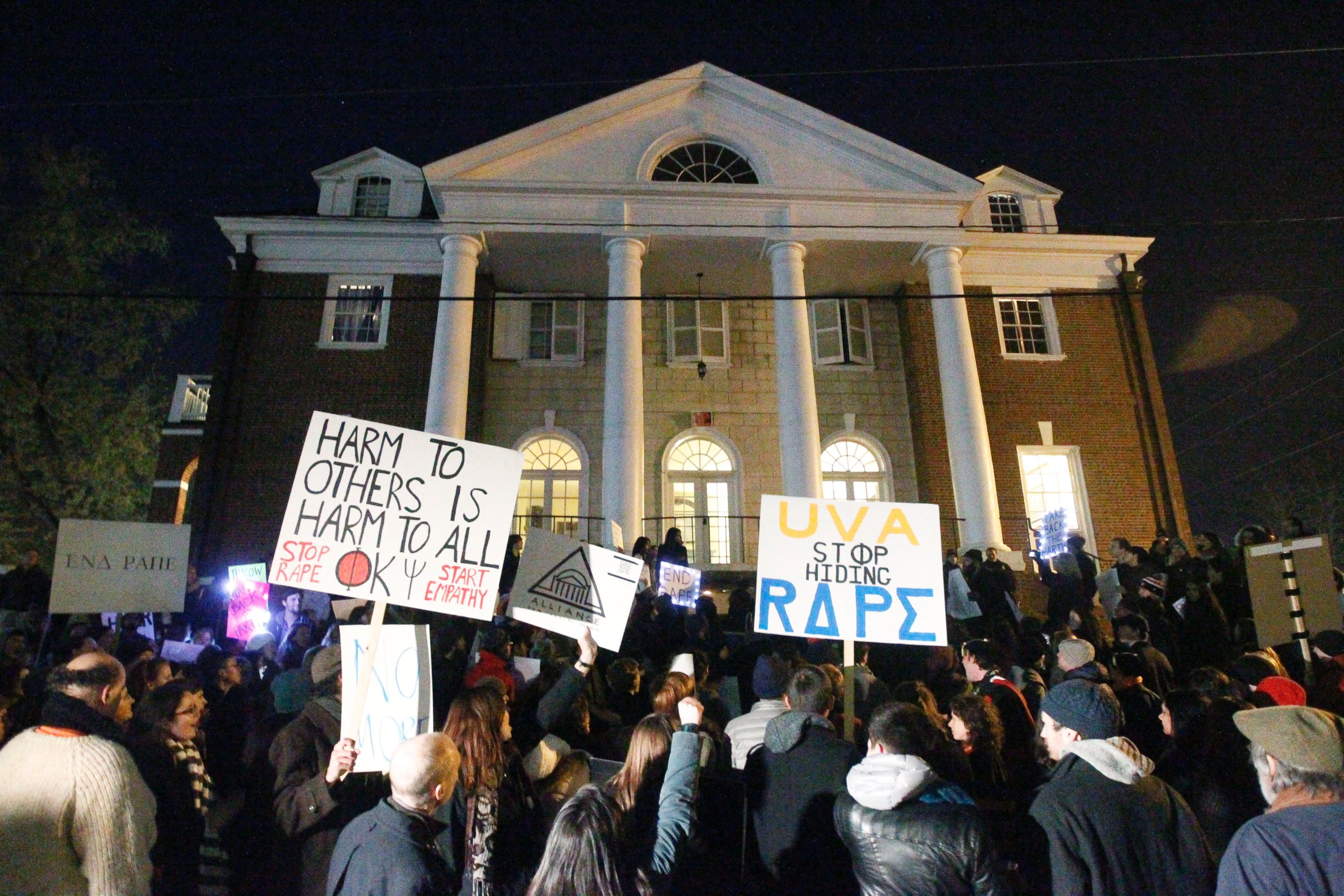UVA's New Greek Conduct Rules Lack Enforcement Provisions
Some students say parties may just move to "satelite houses."
— -- The vaunted new conduct policy for fraternities and sororities at the University of Virginia is missing just one thing: enforcement by the university.
"It has always been the expectation that fraternities and sororities abide by the law and the University's Standards of Conduct, in addition to the requirements outlined in the Fraternal Organization Agreement," UVA spokesman Anthony de Bruyn told ABC News on Friday.
He noted the fraternity and sorority houses are privately owned and operated and, therefore, the university has no plans to provide staff to babysit parties and other functions. If violations are brought to the university's attention, the Dean of Students' Office would investigate.
The rules were announced this week as part of the process of restarting Greek activities on the scenic, iconic Charlottesville campus that was rocked last semester by a now-discredited magazine article that described a culture of drinking and sexual abuse at UVA.
Goodbye to the kegs and mixed drinks. Beer must now be served in cans. And fraternities are required to register their functions with the Inter Fraternity Council by 11:59 p.m. the Tuesday before an event. So-called "sober monitors" will be on hand for all official chapter gatherings. And those same monitors will be responsible for pouring wine if that is to be served.
The rules -- a striking departure for a university as well known for its Greek life as for being founded by Thomas Jefferson -- were announced by UVA President Teresa Sullivan Tuesday.
Under fire for the article published in November in Rolling Stone, Sullivan had temporarily banned all Greek social activity.
The article, replete with shocking details, told the story of an alleged violent gang rape two years ago of a woman named "Jackie," who it said had been lured to the UVA Phi Kappa Psi fraternity house and then brutalized for hours.

A Rolling Stone spokeswoman said last month that an internal review of the story was continuing. But the magazine backed away from key points after acknowledging that the author did not contact a key person in the narrative at the request of the article's central figure, rape victim "Jackie."
Inter Fraternity Council President Tommy Reid conceded this week in an interview to the campus newspaper, The Cavalier Daily, that enforcement of the new regulations will vary.
"Fraternities are accountable to themselves, and there will be a monitoring system administered by the IFC," Reid told the paper.
Sen. Kirsten Gillibrand, D-New York, who has been pushing for tougher campus sex-assault laws, was disappointed by the new regulations at UVA.
"Without enforcement, rules are meaningless and that's exactly the problem we've seen across college campuses," Gillibrand said in a statement tonight. "A UVA Dean has said students who have admitted guilt to committing sexual assaults have been allowed to remain on campus without suspension, which also allows them to potentially continue attacks against more victims. One study has shown that nine out of 10 rapes are committed by serial offenders, who are responsible for an astonishing average of six rapes each. We have a responsibility to act to protect students against sexual assault, and to ensure justice for victims when these crimes occur."
Lena Richards, a 21-year-old fourth year student said she doubts the new policy would do much to make female students safer.
"I actually think the rules are good in theory, but a lot of them already existed in some form or another, and were ignored," Richards told ABC News today. "I definitely think fraternities need to be safer and need to play a role in preventing sexual assault and safer drinking environments are important. But if the school doesn't strongly enforce these rules and really make a sincere effort to regulate fraternities then I'm afraid they won't do much good."
With the new rules in place, fraternities and sororities got back to business at UVA this weekend.
But fraternity row remains eerily quiet. Old beer cans and broken glass still litter the front lawn and the steps leading up to Phi Psi, where the alleged attack described in Rolling Stone is said to have occurred.
The view of the front entrance of the house is blocked. Furniture lines the front porch.
First year girls in the middle of sorority rush walk from sorority house to sorority house, some turning their heads to get a glimpse of the fraternity.
One member of a different fraternity, a third year student at UVA, said he thinks some of the new regulations are necessary -- specifically the "sober brothers" regulation -- but expects the partying culture will simply move underground. He said fraternities will just relocate their parties to the "satellite houses" -- houses where brothers of a particular fraternity live that are completely separate from the main chapter.
"Now there is going to be a race to see what fraternity can get the best satellite houses for their parties," said the student, who asked not to be identified because his organization instructed members not to speak with the media.
Sorority members are also questioning the new rules.
"I think the rules will be enforced for the most part. But students will still want to drink underage coming to college. This will just change where they do it," said a fourth-year student and sorority member who also declined to be identified because her organization instructed sisters not to speak with the press. "It will increase the amount of satellite house and other house parties and decrease parties at the actual fraternity house."
She added: "The problem is that this isn't a quote unquote cure-all for binge drinking and the consequences that stem from it. If a student can't drink at the fraternity party, he or she will drink before at other parties at the university."




